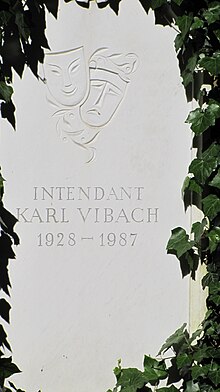Karl Vibach

Karl Vibach (* 14. September 1928 in Paderborn , † 10. June 1987 in Lübeck ), a German theater was director and - intendant , screenwriter and actor.
Life
Karl Vibach was born in Paderborn and grew up in Breslau , where he attended school. He was already on stage as a schoolboy and often worked as an extra in performances of the Silesian Opera . Towards the end of the Second World War he was drafted into the Wehrmacht as a soldier .
In 1946 he began his training at the Max Reinhardt School of the German Theater in Berlin . There he met Gustaf Gründgens . He then worked on stage in Stuttgart and Kassel. As a film actor in front of the camera he was in Morituri (1948, directed by Eugen York ) with the role of the German soldier Georg, and in the comedy We'll talk about love later (1953, directed by Karl Anton ) as Carlo Hollmann. In Kassel he met the actress Marianne Schubart , whom he later married in Krefeld.
In 1952 Gründgens hired him as his assistant director in Düsseldorf; In 1955 he went with Gründgens to the Deutsches Schauspielhaus in Hamburg, where he also appeared with him in his Faust production. As artistic director he accompanied the Faust Ensemble Gründgens' to Moscow, Saint Petersburg (then Leningrad) and New York. In Moscow he stepped in for Gründgens as Mephisto at short notice .
In 1960 Vibach left Hamburg and, as Germany's youngest artistic director, became head of the Nordmark Theater in Schleswig , today part of the Schleswig-Holstein State Theater . As the successor to Günther Lüders , Vibach moved to the State Theater in Stuttgart in 1963 , where he was acting director.
In 1967 Vibach came to Lübeck and was initially appointed director of the Lübeck Theater and soon became general director on his own initiative. In the eleven years of his work he created 140 of his own productions and brought musicals to the stage for the first time in the city . He got to know this form of musical theater during a stay in the USA. It corresponded to his preference for actors who had broken away from the traditional theater branches and could speak, sing and dance.
His greatest musical successes included productions such as Schwarzer Jahrmarkt , Porgy and Bess , Cabaret or The King and I with Freddy Quinn and Lady in the Dark , which he translated into German with his wife Marianne Schubart-Vibach ( The Lady in the Dark ). The lavish revue and musical productions with well-known actors beyond their career high point, such as Luise Ullrich in Alexis Sorbas , met with great approval from the audience, but met with displeasure from the orchestra musicians, who felt they were under-challenged. In the magazine Theater heute Vibach was accused of turning the Lübeck theater into an entertainment theater; General Music Director Bernhard Klee left the theater in 1973, and General Music Director Matthias Kuntzsch left the theater before his contract expired.
In addition to his theater work, Vibach wrote the screenplay for the television plays Eine kleine Harmonielehre (1966) and Paradies auf Erden (1967). Between 1963 and 1971 he also directed films, mostly for television films.
The next stops were in 1978 at the Theater des Westens in Berlin, followed by the Hamburg Operettenhaus . There his Great Freedom No. 7 with Freddy Quinn was a financial failure. In the summer of 1984 Vibach took over the management of the Bad Hersfeld Festival . On January 13, 1987, he was seriously injured during a theater rehearsal on the stage of the Schauspielhaus Zurich . While still in bed, he organized the Bad Hersfeld Festival in 1987. On June 11, 1987, at the age of 59, he died in Lübeck from the consequences of the injury he had suffered in Zurich.
Karl Vibach's grave is located in the Lübeck Burgtorfriedhof .
literature
- Wolfgang Chechne : The quiet end of a theater life . In: Lübecker Nachrichten of June 11, 1987, p. 13
- Günter Kohfeldt: On the death of Karl Vibach - looking back on a successful era . In: Lübeckische Blätter dated June 27, 1987, p. 219
- Wolfgang Chechne: Lübeck and its theater. The story of a long love . Reinbek 1996, pp. 151-170, pp. 230-255 ISBN 3-923707-29-0
- Klaus Benneke: Four decades, four directors - the last of their kind in Lübeck? In: Lübeckische Blätter from June 27, 2008, pp. 228–230 ( Online ; PDF; 13.9 MB)
- Günter Kohfeldt: Marianne Schubart-Vibach and the Karl Vibach era in Lübeck . In: Lübeckische Blätter from June 27, 2008, pp. 231–233 ( Online ; PDF; 13.9 MB)
Web links
- Literature by and about Karl Vibach in the catalog of the German National Library
- Karl Vibach in theInternet Movie Database(English)
Individual evidence
- ↑ a b Musical specialist (PDF; 156 kB) on the theaterluebeck.de page
- ↑ Klaus Benneke: Four decades, four directors - the last of their kind in Lübeck? In: Lübeckische Blätter of June 27, 2008, p. 228
- ↑ Extinct love . In: Der Spiegel 14/1985 of April 1, 1985, pp. 243–246 ( online version)
| personal data | |
|---|---|
| SURNAME | Vibach, Karl |
| BRIEF DESCRIPTION | German theater director and director, screenwriter and actor |
| DATE OF BIRTH | September 14, 1928 |
| PLACE OF BIRTH | Paderborn |
| DATE OF DEATH | June 10, 1987 |
| Place of death | Lübeck |